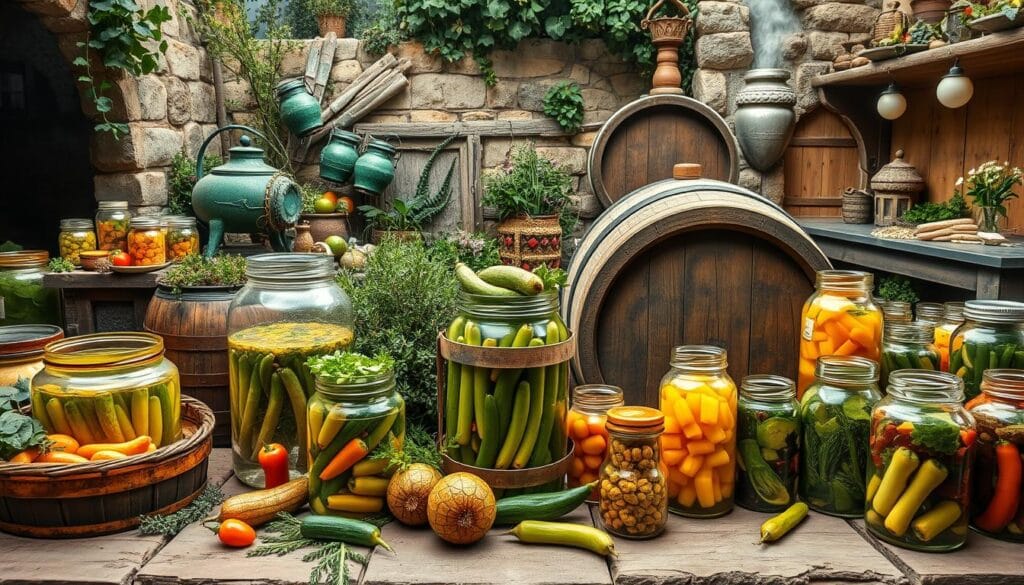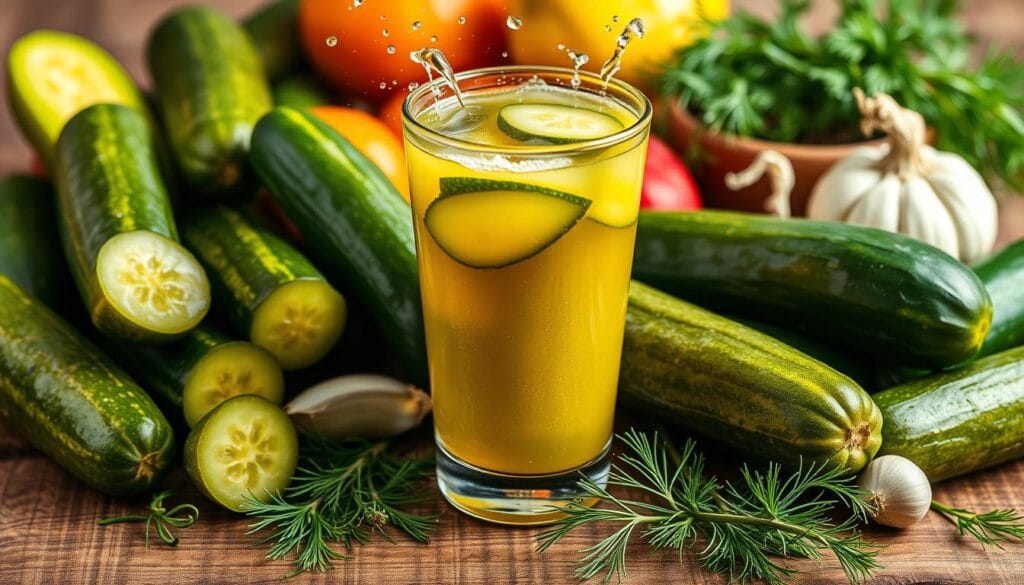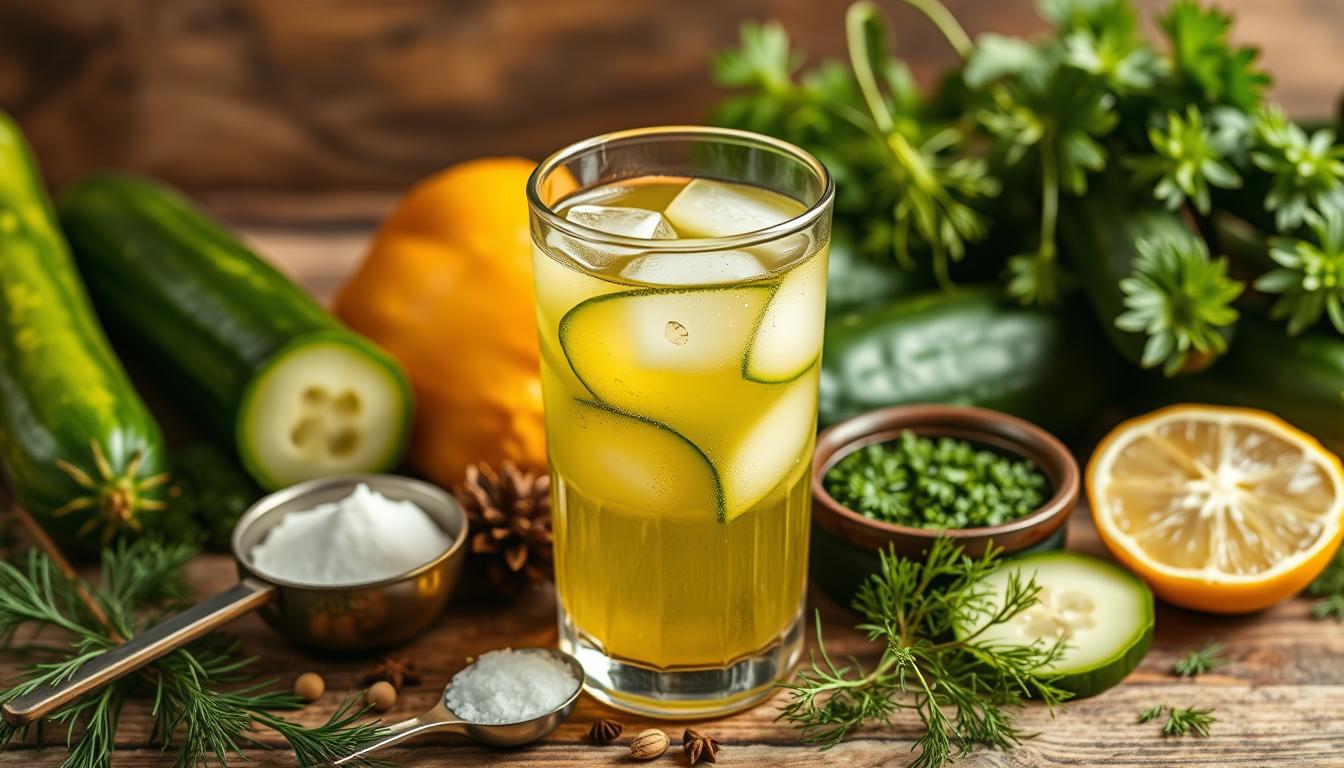Benefits of Pickle Juice: Health Perks & Uses
As I grabbed the glass of cool, tangy Pickle-juice, a wave of nostalgia hit me. My grandmother used to make famous pickles, and we’d drink the leftover brine on hot days. It was more than just a drink; it was full of health benefits.
Pickle-juice is not just tasty; it’s packed with nutrients like sodium, potassium, and magnesium. These are key for staying hydrated and keeping muscles working right. Some say it can even help with hangovers, blood sugar, and sports performance. But, because it’s high in sodium, you should drink it in moderation.
If you’re an athlete or just want to feel better, try adding Pickle-juice to your routine. It could change the game for you. So, take a sip and discover the health benefits of this amazing drink.
Table of Contents
Understanding Pickle Juice Composition
Pickle-juice is a tasty liquid with a unique nutritional profile. It’s made from a brine solution that’s full of flavor. Let’s explore its ingredients, types, and health benefits.
Key Ingredients in Traditional Pickle Brine
Pickle-juice is made of water, vinegar, salt, and spices. The fermentation process, thanks to Lactobacillus bacteria, gives it a sour taste. But, many commercial brands use vinegar instead of fermentation.
Different Types of Pickle Juice
- Homemade fermented Pickle-juice: It has probiotics and antioxidants from fermentation.
- Store-bought Pickle-juice: Often has vinegar and may include artificial additives.
- Specialty Pickle-juice: It comes in flavors like dill, garlic, or spicy.
Nutritional Profile Overview
The nutritional value of Pickle-juice varies. An 8-ounce serving has up to 821 milligrams of sodium. This is a big part of the daily sodium intake. But, fermented versions might also have carbohydrates, calcium, potassium, magnesium, and probiotics.

The high sodium content in Pickle-juice is a concern for some. It’s important to drink it in moderation, especially if you have health issues like high blood pressure or kidney disease.
The History and Evolution of Pickling
Pickling, the ancient art of preserving foods, has a rich history. It dates back to around 2030 B.C. in the Tigris Valley. Archaeological evidence shows cucumbers were first preserved in salt and water.
As this method spread, pickling became a staple in many cultures. Over time, pickling techniques evolved. Now, pickles and their juice are enjoyed worldwide, with both traditional and commercial production methods available.
Pickling has a long history in the Middle East, Asia, Europe, and the Americas. In South Asia, pickles are made with mango, lemon, lime, and chili. In Korea, kimchi is a fermented, pickled side dish. In Hungary, pickles like sauerkraut and stuffed peppers are loved.
Pickles were important in historical expeditions and military campaigns. Napoleon Bonaparte valued their health benefits for his armies. Pickles ensured food preservation during long voyages, like those of Christopher Columbus and Amerigo Vespucci.
Today, pickles still hold cultural significance. Unique pickling techniques and ancient pickling methods exist alongside modern production. From classic kosher pickles to innovative global flavors, pickling’s history and evolution continue to fascinate food lovers worldwide.

Essential Nutrients Found in Pickle-Juice
Pickle-juice is more than a tangy condiment. It’s a rich source of essential nutrients that offer health benefits. It’s packed with electrolytes, minerals, vitamins, and beneficial compounds.
Electrolytes and Minerals
Pickle-juice is known for its high levels of sodium, potassium, and magnesium. A large dill pickle can give you over two-thirds of the daily sodium for adults. This makes it great for athletes and those who sweat a lot. But, it’s not good for people with heart or blood pressure problems because of the high sodium.
Vitamin Content
Pickle-juice also has vitamins like vitamin C and vitamin E. These vitamins are antioxidants that fight off harmful free radicals. Plus, it’s a good source of vitamin K, giving you 70% of your daily value.
Beneficial Compounds
The acetic acid in vinegar-based Pickle-juice has health benefits. It may help improve insulin sensitivity and control blood sugar. This makes it a good choice for managing blood sugar levels.
Some pickle-juices also have dill and garlic added. These ingredients add more nutritional value and health benefits.

The nutrient content of Pickle-juice can vary. It depends on the pickling method and ingredients. Always check the nutrition label to know what you’re getting.
Athletic Performance and Pickle Juice
Athletes are always looking for natural ways to boost their performance and recovery. Pickle-juice has become a surprising, yet promising, option. It’s high in sodium and has a mix of electrolytes, making it a good alternative to traditional sports drinks for sports nutrition, electrolyte replacement, and post-workout recovery.
Studies have shown mixed results on pickle juice’s effect on athletic performance. It might not greatly increase exercise capacity. But, it could help with hydration and muscle cramps after working out. In fact, Pickle-juice can stop cramping 40% faster than water alone.
The use of Pickle-juice to fight cramps started in the late 1990s. It became more popular in recent years. In 2000, the Philadelphia Eagles credited their win against the Dallas Cowboys in a heatwave to pickle-juice. This game is now known as “The pickle-juice game.” Wimbledon men’s champion Carlos Alcaraz has also used it during his matches.
Experts think the sodium, potassium, and acetic acid in Pickle-juice might help athletes. They recommend about 80ml or 1/3 of a cup. Too much can be bad because of the high salt.
As athletes look for effective cramp remedies and ways to improve sports nutrition, electrolyte replacement, and post-workout recovery, Pickle-juice is a popular choice. But, products like CrampFix are also becoming popular for their ease of use and taste.
Natural Muscle Cramp Relief Properties
Pickle-juice is a surprising natural remedy for muscle cramps. A 2010 study showed it works faster than water. It might stop muscle cramps by affecting the nerves, not just by adding electrolytes.
Research says drinking about 1.5 ounces of Pickle-juice per 100 lbs of body weight helps. This is good for athletes who get cramps during or after sports.
Scientific Evidence Behind Cramp Relief
A 2020 study found Pickle-juice and yellow mustard are best for muscle cramp prevention. A study in The Journal of Strength and Conditioning Research suggests Pickle-juice affects muscle cramping by changing neuron function.
But, not all studies agree. A 2021 study in Applied Sciences found no big difference in cramp relief between Pickle-juice and water.
Recommended Dosage for Athletes
The best amount of Pickle-juice for athletes is still being studied. But, a common guideline is 1.5 ounces per 100 lbs of body weight. This helps reduce muscle cramp time.
More research is needed to understand pickle-juice’s effects on muscle cramps. Always talk to a doctor before trying it, especially if you have health issues.
“Pickle-juice and yellow mustard have been reported to reverse muscle cramps in hockey players, football players, and other sports enthusiasts.”
Digestive Health Benefits
If you love pickles, you might be surprised to learn about their digestive health perks. The juice from pickles is packed with probiotics, thanks to how they’re made. This makes Pickle-juice a probiotic-rich drink.
The probiotics in Pickle-juice help keep your gut healthy. A healthy gut is key for digestion, absorbing nutrients, and a strong immune system. Research shows that these probiotics can help with irritable bowel syndrome (IBS) and inflammatory bowel disease (IBD).
Pickle-juice also has vinegar, which aids digestion. Vinegar can boost stomach acid, helping break down food better. Some people find it helps with indigestion, heartburn, and upset stomach. But, more studies are needed to prove this.
While Pickle-juice has health benefits, too much can cause problems like bloating, gas, or diarrhea. This is especially true for people with sensitive stomachs. Always eat and drink in moderation.
Pickle-juice can be great for your gut health and offers probiotic benefits. It also adds a unique flavor to your diet. Just remember to listen to your body and talk to a doctor before adding fermented foods to your meals.
Blood Sugar Management Support
For people with blood glucose issues or diabetes, Pickle-juice might help. It contains acetic acid, which studies show can improve insulin response. This can also help control blood sugar levels.
How Vinegar Content Affects Glucose Levels
The vinegar in Pickle-juice slows down how food moves from the stomach to the small intestine. This slow process means glucose is released into the blood more gradually. It helps avoid sudden spikes in blood sugar after eating.
A 1998 study by Liljeberg and Björck showed vinegar can improve blood sugar levels by slowing down stomach emptying. In 2017, Shishehbor et al. found vinegar can lower blood sugar and insulin levels after meals.
Timing and Consumption Guidelines
- To help manage blood sugar, drink 1-2 tablespoons of Pickle-juice before or during meals, especially those with lots of carbs.
- People with diabetes or blood glucose issues should talk to their doctor before adding Pickle-juice to their diet. It’s important to watch the sodium in store-bought Pickle-juice.
Pickle-juice can be a good way to manage blood sugar without big changes in diet. The vinegar in it can really help with blood sugar and insulin control. It’s a great addition for those trying to support their blood glucose, insulin response, and diabetes management.
“Consuming vinegar or pickles before meals, especially those high in carbohydrates, can be beneficial for managing blood sugar levels and insulin resistance.”
Hydration and Electrolyte Balance
This juice has a lot of sodium, which helps keep fluids in your body. This can be good when it’s hot or you’re working out hard. You lose a lot of electrolytes through sweat, and Pickle-juice can help replace them.
But don’t use Pickle-juice as your only drink. It has a lot of sodium, so drink it in small amounts. To stay hydrated, drink lots of water and eat foods and drinks with lots of electrolytes. Think about coconut water, bananas, and Buoy’s Hydrating Wellness Drops.
Pickle-juice can help keep you hydrated and balanced, especially when it’s hot or you’re very active. Just remember to drink it in moderation and use it with other ways to stay hydrated.
Thank you for reading! If you enjoyed this article, check out more delicious recipes and drinks at Freshrecipes.net/blog.

